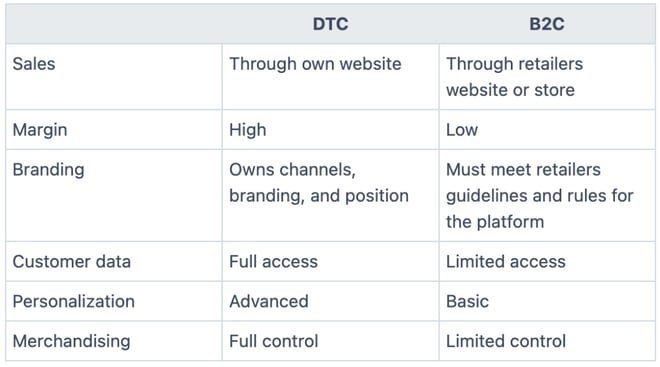What is Direct-To-Consumer (DTC) Marketing?
The Complete Guide, with Strategies, Tactics and Examples [2023]
Direct-to-Consumer marketing is when brands bypass traditional distribution channels and sell directly to their customers.


As a marketer, your goal is to grow brand awareness and sales, while keeping customer acquisition costs low. DTC marketing is a superb way to do that.
While partnering with big retailers has its benefits, DTC brands experience several advantages by owning their own marketing channels:
More control over product branding, positioning, marketing, and distribution channels
First-party data on customers, so you better understand who your buyers are
Faster time to market to launch new products at lower prices
Higher margins, because you don’t need to sell products to retailers at a discount
DTC brands are more proactive when it comes to marketing. They don’t have the built-in audiences mega-retailers like Walmart can offer. So they use various strategies to promote themselves, such as influencer marketing, SMS marketing, communities, and email.


DTC vs B2C: What is the difference?
In DTC, you own the brand experience. There’s no wondering how a retailer presents your product on the shelf, no guessing who’s taking it to checkout. Instead, you tell the story of your own brand and how your product weaves into it. Additionally, the avenues of getting to know your audience are now pretty close to limitless.
Business-to-consumer (B2C) companies also market to consumers but often sell through digital and physical retail outlets. They do not need a storefront or website to generate sales. The retailer handles most of the marketing and lead generation.
DTC brands differentiate by putting the consumer first. There’s no intermediary to rely on for marketing.
DTC brands must focus on bringing customers directly to them and forming strong relationships over time to succeed.
In DTC marketing, retention wins over acquisition.
DTCs are responsible for the entire customer journey. As a result, they can offer more personalized and consistent experiences than the average e-commerce company. This drives customer loyalty.
But while direct-to-consumer marketing offers apparent advantages, it will require more marketing creativity and new strategies that challenge conventional retail marketing methods.
Let’s examine the advantages of direct-to-consumer marketing and discover what we can learn from successful DTC brands.
